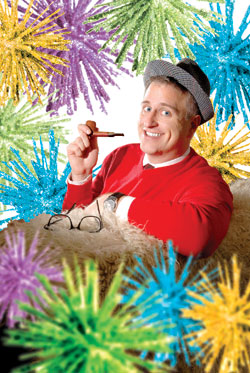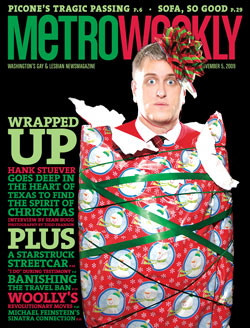Wrapped Up
Hank Stuever goes deep in the heart of Texas to find the spirit of Christmas
The beast is almost here.
Do you hear the tintinnabulation of its bells around the corner? See the glinting gold and silver of a million mall store baubles dangling from its evergreen limbs? Smell the scent of eggnog and casseroles and decorative spray snow that triggers fond memories of family celebrations that never actually happened?
Yes, Christmas is coming.
And Hank Stuever is right there with it.

Hank Stuever
(Photo by Todd Franson)
Widely known as a sometimes quirky, occasionally sardonic and always talented writer for the Washington Post, where he recently took the reins as the paper’s TV critic, Stuever spent the past three Christmases experiencing the highs and lows of the holidays with three families in Frisco, Texas, in search of the meaning of America at the heart of the most American of celebrations. The result, Tinsel, hit bookstores this month.
From the supermom who runs a side business decorating people’s homes for Christmas to the family who puts on the biggest holiday light show in town to the single mother looking for the reassurance of the season in the midst of difficult times, Stuever captures the multitude of meanings Americans attach to a holiday that’s grown from a religious celebration into the very underpinning of the American economy.
Not that it was an easy undertaking, as he moved to Texas for months at a time to immerse himself in Christmas spirits. That meant leaving behind for months at a time his partner, photographer Michael Wichita. (The couple met, it should be noted, in 2002 when this writer first interviewed Stuever, and Wichita, then Metro Weekly‘s staff photographer, shot him dressed as a paper boy.) So, after spending three Christmases apart, how will they approach the oncoming holiday season?
”Our response to Christmas this year is to save my relationship,” laughs Stuever, relating the couple’s Christmas itinerary that includes a flight to California and a drive to Palm Springs in order to ”do nothing, except just be with each other and not think about Christmas.”
Of course, trying not to think about Christmas is likely as futile as avoiding Christmas carols and TV holiday specials in December. But sometimes, in order to understand Christmas, you have to immerse yourself in reindeer and lights and tinsel. And if you find the heart Christmas, you may just find the heart of America.
METRO WEEKLY: In our previous interview, you said at one point, ”I love Texas. Okay, officially I hate Texas but I love writing about it. I think those places are actually more interesting places to be gay.” Obviously, you spent a lot of time in Texas for this book. How did the people react to having a gay D.C. reporter in their midst?
HANK STUEVER: You know, that quote has come back to bite me a couple of times. Of all these people down in Texas that I was meeting [with about the book], somebody said, ”Well, look what he said about Texas.”
The town itself is just starting to sort of wake up to the book. I didn’t widely broadcast, ”I’ve arrived and I’m writing this book and the whole town is going to be in it.” I just moved there. I moved into a house with this ex-marine and his girlfriend. It was one of those gigantic houses with the vaulted ceilings and a great little bedroom/bathroom suite downstairs that I rented.
I recently met a friend of a friend who lived with his partner in this same town, Frisco, Texas. He’s from Oklahoma, like I am, and we both share this recognition that it’s such a strange little world to live in when you’re gay — like it’s the exurbs and there are no gay people there. But there are. He and his partner have the big house on a cul-de-sac, they host barbecues — they were the gay guys on the street. So, it’s possible even there.
But the fact is they all voted against gay marriage. There were lines around the polling places [in 2006], not because people were just dying to vote for governor, but because they wanted to ban same-sex marriage. It’s that really Southern charm: they love the guy who does their eyebrows and they hate the gay. Deep down they’re just never going to get past it. But they do need help decorating, you know. They have friends from high school who are gay and they want you to know that — and they want you to know they’re totally comfortable with it. Then they go in that voting booth and pull that lever and they’re doing us no favors at all.
MW: Did you feel like an observer the entire time you were there or did you start feeling like you were part of that community?
STUEVER: I had about 10 potential families that were going to be in the book. By the first Christmas, I was really following five and the book wound up focusing in on three. And in each one there was a different approach about gay. You can’t spend too much time with me before I open my mouth and flowers and an entire season of Project Runway come out. You would have to be really not savvy not to know that there’s a gay man wanting to hang out with you and your family at Christmas.
One family was like, ”Do you have a partner or boyfriend? What does he do?” Tammi, the decorator, has to know everything about everybody, so at our very first meeting she was just after me with questions: ”What does Michael do? How did you meet?” And then another family, they just never asked. And I never told. [Laughs.]
MW: Every family approaches Christmas its own way and with its rituals and such. How much of a Heisenberg thing goes on when you’re there as part of it? Did you ever get the feeling that people were trying to make their Christmas better or different for you?
STUEVER: That’s partly why I showed up in August. I wanted to meet people I could potentially follow through Christmas, who would be willing to let me be there and understand that mostly I wanted them to ignore me. That’s just about sitting very still and listening and asking questions only in a way that explains what’s going on — or saving all your questions for later. I have no doubt the Heisenberg principle is definitely happening. That’s why I did three Christmases with them, too. If I had stopped at just one, I wouldn’t have fully understood them. After 2006, I went back a total of 12 times in 20 07 a nd 2008, to make sure [I saw] how they were changing: families change, feelings change and the economy changed. I wanted to make sure I had the people as right as I could get them.
I think they were pretty comfortable with me. They have said, in retrospect, ”We became so comfortable with him he was like part of the family.” And I kept reminding them I’m the part of the family that writ es everything down and puts it in a book. [Laug hs.] They fed me, they prayed for me, they bought me Christmas presents. I wanted to take a big long bath in other people’s Christmases, whatever over-the-top kind of thing they’re doing. And some of them do over-the-top things, some of them don’t. They’re all normal. In fact, that was my big worry was that they were all so normal that they wouldn’t make an interesting book. In stories now and certainly on reality television, we’re used to the most extreme people and I was just looking for normal people living in McMansion-ville, big-box-store world, mega-church world. The people were extreme in a way, but they were also so normal and what’s interesting to me about them is their normalcy. Their heartaches and their joys are the story of Christmas.
MW: Do you think we urban gay people misunderstand the people from those worlds, or do we understand them fairly well?
STUEVER: To a degree, we misunderstand people who live out in the red because we’ve been trained a little bit to think of them as easily manipulated. And certainly, so many of us come from those places and were wounded by having grown up there, and yet are painfully sentimental about them. We all know that our meemaws and our neenees and our nanas are politically hopeless. They believe a lot of things that are just painful to us. But they are not bad people. They are, in so many ways, wonderful and so much more real than they look on a demographic map. Which makes it a whole lot easier for me to go there — I’m not going out there to change a law, I’m just going out there to take some notes.
America’s like this dream — not a bad dream, but this hallucinating dream of consumerism. This is why I picked Frisco, because it is like anywhere. You drive across the country and see these suburbs and you look off the freeway, and the way that Pier One is next to the Barnes & Noble is next to the Chili’s: It’s all the same. And certainly the best part of moving there was the shopping. I mean, Michael and I will go out to Tyson’s Corner at the drop of a hat, but I had not lived the way people live out there. Even a busy work day is filled with shopping in some way or another and the weekends are just jam-packed with living the box-store life.
And people have these gigantic closets. I always thought you’re doing really good reporting at an intimate level if you get to see inside their refrigerator. But my new thing was, ”Can I see your closets?” Because we were talking about Christmas and my first question for people was, ”Where do you keep all this shit?” And they’d say, ”Oh, well, I have a walk-in attic with all my nativity scenes I’ve collected from all over the world.” And I’m just like, wait, you had me at walk-in attic. [Laughs.]
MW: Now that Tinsel is out, do find that people are eager to tell you about their own Christmas stories?
STUEVER: Yeah, and I’m pretty eager to listen. I had an enormous appetite for that at the beginning, and I have an appetite for it now. Come Dec. 25 this year, I’ll probably have a steep decline in interest. [Laughs.] I wrote this book because, while there’s Christmas on the cover and it’s about Christmas, it’s really about America. It’s about what we became, it’s about our strange economy that is hinged on going to the shopping mall every single day. We’re talking about this economic recovery and it hinges on all of us going back to the mall and spending money we don’t have.
There’s that sort of make-believe, and I measure that against the make-believe of Santa Claus and that everybody’s happy and that everybody loves one another, when really Christmas is the great American mind fuck, and that’s what I’m interested in hearing from people. What do you love about Christmas, but how has it messed you up? Thanks to Charles Dickens, we have this massive cultural guilt trip about if you’re not happy at Christmas then something’s wrong with you. If you have problems with Christmas, you’re the Scrooge.
And you know, layer on gay and maybe not talking to your family, I love those stories, too. We’ve all met the gay man who overdoes Christmas — talk to him for a little while and you find out he’s not talking to his father, he’s not talking to his uncle, he hated high school, and he’s got more Christmas shit than your meemaw. I’m interested in that. I’m interested in why. Sometimes it’s not that complicated. But I have met more than one time that gay man who has a little too much Christmas going on and when you ask him about it has a little too much grief going on, too.
MW: Christmas as a mental medicine?
STUEVER: Yeah. And we all come from families where, well, just about everybody’s got a drunk, and those people love Christmas. [Laughs.] And everybody’s got something that happens a little too close to Christmas: a car wreck, a plane crash, a drowning. Everybody’s got a reason to dread Christmas sometimes. It’s this gigantic red and green and gold thing that’s plopped down in front of us, and it’s says to all of us, ”You need to be happier. Get it together, be happy.”
Some people have said the book is way too negative about Christmas. One of the people in it said, ”You know, I didn’t know your book would be so negative, that you’re a negative person.” There are a lot of people out there who believe you can positive-think your way out of cancer, out of debt — that whole thing is really going on out in America right now. So some people’s reaction to this book is, ”Hank just needs to get happier.” Which, you know, what makes me happy is truth. And people’s truths and their little hang-ups and their sad moments are the truest things, and their Christmas lights are a happy thing. I want to know about all of it, I want the whole picture of these people.
MW: How have the people in the book reacted to it?
STUEVER: I’m still worried that they’ll be hurt by it, by what’s in it. I feel kind of bad talking about how they react to it because I want them to talk about how they reacted to it, but they don’t all love it, they don’t all hate it. Everybody’s got something they wish wasn’t in it, but they’re all okay with it. Now we’re all in it together, because I’ve seen some reviews online that are kind of mean to people in the book, that I wish were mean to me. I can take it. Criticize my book but lay off the people. We live in this world now where if you’re online you can say whatever you want to whoever you want. If you see a reality TV show and you hate the people in it, you just go find them and let them know how much you hate them. But I hope that people will take it out on me and not them.
MW: Since the book is about America, and we’re talking about America — is that new capacity for anonymous hating something that’s changing us as Americans?
STUEVER: Maybe. I mean, certainly at the Washington Post the idea was that we were opening the comments sections for people to actually have reactions to the material presented, but it’s just cuckoo-land. It’s easier to be crazy now. It’s easier to have a venue to be crazy. I think it’ll be several years before we know if the internet improved society or not. I mean, it improved research, and it improved information, but it devalued information, too. I think we’ll lose all of our traditional media. We will live in a sort of a renaissance of chaos, out of which will come whatever replaces 600 years of the printed word. We’re just unlucky to be in the middle of it. Because I bet the people who will figure out what the American dialogue and American media will look like haven’t been born yet. I think it’s that long of a thing. So right now we’re just living in chaos, with people and their opinions and the free flow of hate, but also the free flow of intellect. It’s all in there together.
MW: How has your job changed as a result of all that? The news industry is different today, but how different are you as a journalist?
STUEVER: Not different enough. I am in the early stages of being a cranky old man. I still value everything that I [always] valued: a good tale well told, the serendipity of a story that you didn’t expect in the newspaper. Our survival techniques [in media now are] that we revert to what’s ”news” and how to present it as quickly and briefly as possible, so a lot of the sort of lark that I used to love is disappearing. [In August] I wrote this exploration of the difference between Sheetz and Wawa, the convenience stores. I used to do tons of stories like that — maybe it’s partly me and maybe it’s partly how the newspaper is evolving but I don’t know that that’s what I’ll be doing as much of any more.
I’m the TV critic now. I wanted that because that’s writing about society itself, as viewed through this prism of television, which is everywhere now — it’s online, it’s in the palm of your hand. What people are watching and how they’re reacting to it and what it means is like writing about culture and who we are. Also, it seemed like something that we would be doing no matter what. I wasn’t so sure that we would always be doing features about Sheetz versus Wawa.
MW: How has that transition to the TV critic post been?
STUEVER: I’m still figuring it out, like when to watch, how much to watch, how to pace myself. There’s a lot of just watching TV. My mother always said, ”Turn it off, go outside, go play, you’re wasting your life.” So when I got the job I called her and said, ”You were wrong.” [Laughs.]
MW: How many channels did you have growing up?
STUEVER: Four: PBS, CBS, ABC, NBC. We got cable when my parents divorced. I was in eighth grade, 1982, and my mother was in a very weak spot emotionally and so she agreed to cable. I used to get babysitting gigs based on who had cable, and not watch the children at all, unless they were between me and MTV.
MW: Since Christmas specials will probably start sometime next week, what about Christmas and TV? Is TV the mirror everybody is to judge their own Christmases?
STUEVER: I had a whole chapter about Christmas and television that I ditched because it got in the way of the narrative tale of these three families. But TV is the great enabler. I was on a plane the other day and in the Skymall magazine was this little, old-fashioned TV that you can buy — inside it is a little Christmas diorama that moves and plays music. I was like, this is kind of genius, because people really do equate television and Christmas.
I remember that year we got cable, that my dad moved out, my mother and I drove to New Mexico and cut down this beautiful pine tree. My dad was allergic to trees and we always wanted a real tree, so that year we got one. It was so big that we had to put it in the den, next to the TV. We had just gotten cable and I could not have been more proud of our den and our television and our cable. All the Christmas commercials and all the Christmas TV shows on this gigantic, wooden-console TV, with the blinking lights and the tree next to it is the perfect decor to me. This blinking Christmas tree in this house of misery, in this house where a 29-year marriage has just been dissolved, and everybody’s seriously unhappy. Why is that the happiest Christmas for me? It’s the television.
Again, it’s the great American mind fuck. It’s like Christmas should look like this, but in order for it to look like this you have to go fight your way through all of that. You have to buy all of this and bring it to your cozy little place and see if it matches what you’re seeing on TV. It’s brilliant.
MW: As someone who works for a major media outlet, why do you think we still have issues with news stories, obituaries and other pieces that leave out basic information about people’s orientation?
STUEVER: I was on a panel about this once, when the obituary thing was just out of control — it was Luther Vandross, Susan Sontag, Ismail Merchant. There was a spate of them where the gayness had been left out, for various reasons. I said that the problem with the obituary thing is that we’re talking about the ends of people’s lives when, really, what we’re bad at is covering gay life. The living, not the dead.
I’m much more worried about how the Post and other mainstream outlets still approach gay with caution. We still haven’t learned about just covering everyday gay, except in the food section and the home section. Washington was sort of the closet capital, and still is in a lot of ways. But the people have changed enough that the Post can at least not look completely unaware of the fact that there are lots and lots of influential, interesting and totally newsworthy gay people and gay things going on in town.
But here’s the thing, and I think this transcends media, and I hate saying this: Straight people, they’re not so interested in us. They really aren’t. And part of it is that to them gay equals a sexual act. The other part of the problem is gay equals not them, therefore not interested. I find this with my extremely enlightened straight friends, they still don’t quite have a handle on the best reason for legalizing gay marriage, which is those thousand civil rights that just automatically transfer with a heterosexual marriage license from state to state. It takes some explaining to them to show how ludicrous it is to set up a crazy quilt America where some states have gay marriage and some states don’t, because if I get married and then by some misfortune move back home to Oklahoma, my rights don’t come with me.
But broadly, people don’t view gay as a culture, they view it as a sex act. And so the Washington Post gets hinky on it, all mainstream media get hinky on it, because they don’t know anything about it. All they know is the idea of gay sex still makes them uncomfortable. Well, the idea of straight sex makes me uncomfortable, but there’s a lot of it in our newspaper. We will always need our gay media to make sure that the fullest experience is represented.
MW: As a gay guy who’s getting older and is in a relationship, how does that change you as a person?

STUEVER: I’m so comfortable. The one thing I sort of ache over when I look back is just how remedial young adult gayhood is. When you go through it, you can’t help but go through a lot of junior-high school situations in your head, because you didn’t get to be a normal person in junior high. You had to be an afraid, closeted, pubescent gay person in junior high, and so your little anxieties and craziness couldn’t get worked out until you were 25. Or 30. And I do sort of ache about how some of that played out. Not that I was bad to people, but it’s painful to look back on. But it’s funny painful. It’s not like $200-an-hour therapy painful, it’s just funny painful what people put themselves through. Maybe these kids today, when they get to come out when they’re 12, maybe it will work out better for them. I’m not sure, but I hope so.
Hank Stuever’s Tinsel: A Search for America’s Christmas Present ($24, Houghton Mifflin Harcourt) is available at area bookstores and online at Amazon.com.’
Support Metro Weekly’s Journalism
These are challenging times for news organizations. And yet it’s crucial we stay active and provide vital resources and information to both our local readers and the world. So won’t you please take a moment and consider supporting Metro Weekly with a membership? For as little as $5 a month, you can help ensure Metro Weekly magazine and MetroWeekly.com remain free, viable resources as we provide the best, most diverse, culturally-resonant LGBTQ coverage in both the D.C. region and around the world. Memberships come with exclusive perks and discounts, your own personal digital delivery of each week’s magazine (and an archive), access to our Member's Lounge when it launches this fall, and exclusive members-only items like Metro Weekly Membership Mugs and Tote Bags! Check out all our membership levels here and please join us today!





















